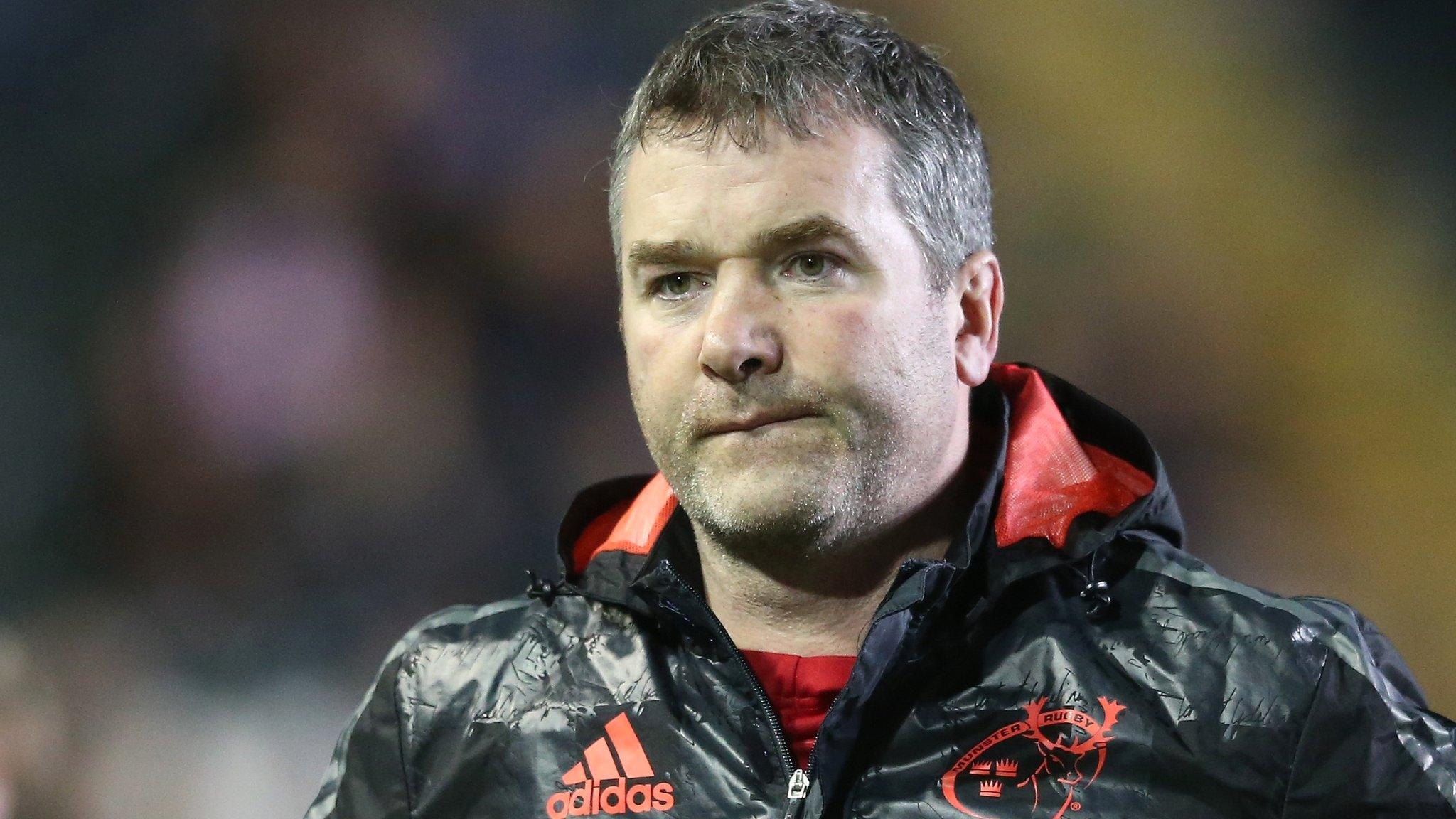Anthony Foley: A community struggles after the death of its favourite son
- Published
- comments
People line streets in tribute to Foley outside Munster's Thomond Park
It is a bright, sunny October day in Limerick in the west of Ireland, the weather unseasonably warm, the autumn leaves in full red and gold glory. And everywhere men are in tears.
The politician. The headteacher. The rugby captain. Team-mates, old friends, strangers in silenced bars. Young lads and old granddads, men in smart blazers, hard men with battered faces. All of them struggling, all of them opened up.
"There's no other conversation in Limerick this week, only Anthony Foley," says the city's mayor, Kieran O'Hanlan, eyes red, standing on the balcony of his offices, looking out across the sunlit streets.
"Whether you're a truck driver or a barrister, a baker or a candlestick maker, everyone in this city plays the game. Limerick is all about rugby, and rugby is all about Limerick.
"I remember the day John F Kennedy was assassinated in 1963, and for us in Limerick, we'll always remember the day and the time that we learned of the tragic loss of our beloved Anthony."
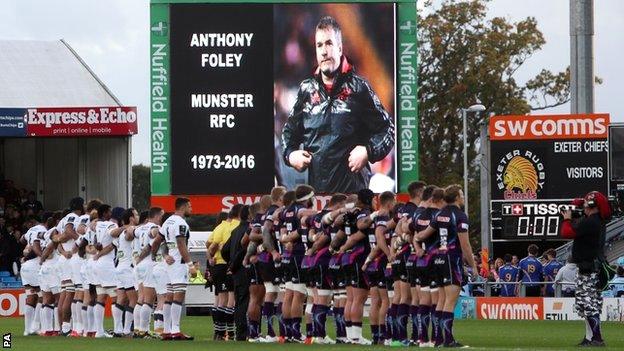
The world of rugby has united to pay tribute to Anthony Foley in recent days
I thought I knew Foley: 62 caps in the back row for Ireland, 201 appearances for Munster, captain when they at last won the European Cup, head coach until his sudden death, aged 42, in Paris last Sunday. But I don't know him, not like Limerick does.
Right across town, from his old school at St Muchin's College, along Merchant's Quay by the banks of the River Shannon, past the grey walls of King John's Castle and out to the clubhouse of his old club side Shannon, nestled up under the main stand at Thomond Park, 'Axel' is being mourned. Except no-one is ready to say goodbye. This is a man being remembered in the present tense, not the past.
Shannon's clubhouse would be familiar to anyone who has played and watched the grassroots game. Polished beer taps, crisps behind long bar. Old team photos along the walls, the young faces of now aged men staring out with a cheeky grin. One special wall reserved for those who have gone on to wear the green of Ireland: Foley, his father Brendan, Mick Galwey, John Hayes. Peter Stringer, Marcus Horan, Jerry Flannery, Donnacha Ryan.
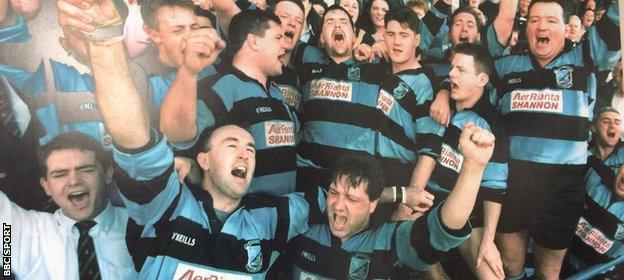
Pictures of his time with Shannon, as well as in the green Ireland, line the walls of Foley's club
Noel Healy, former team-mate of Foley's for Shannon and Munster, his long-time golfing partner, now club president, is sitting behind an ancient wooden table, unable to make sense of any of it.
"Disbelief. Of course there's disbelief," he says, taking deep breaths.
"Our chairman phoned me on Sunday. I was in the car, and he told me to pull over. He said, 'Axel was found dead this morning in Paris.' I said, 'No no, you must mean Brendan.'
"I just broke down. I must have held traffic up for about 20 minutes, because I just stopped in my tracks. I can't get the memory of that 20 minutes back.
"Someone had to knock on the car window and ask me to move. Since Sunday, 12 o'clock, half my world has fallen apart."
Healy was there as a kid, sitting on the back wall, when a Munster team featuring Foley's father pulled off their famous win over the touring All Blacks in 1978. Today he is waiting for the body of his friend to be brought back from Paris, organising a guard of honour when the hearse comes past the rugby pitch where Foley made his name.
"We get through it with our club, our friends," he says. "The outpouring of grief has been huge - across Limerick, across Ireland. Sunday we opened our club at 3 o'clock, and it hasn't been closed since. It will remain open until Anthony is buried.
"We have at least 10 books of condolence already. We open them at 7.30am and we close them at 10pm, and I'm convinced if we left them open at night we'd still have people signing those books. It just shows what he was, and what he meant to people.
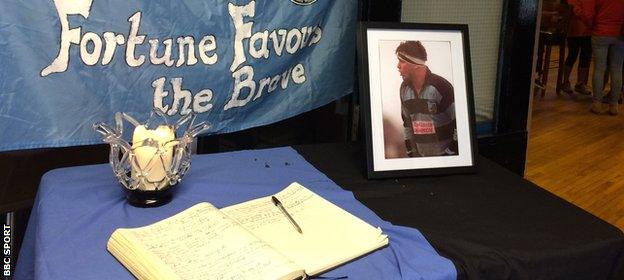
Books of condolence at Shannon were soon filled as people flocked to honour Foley
"We have hugged and we have cried. Why wouldn't you get together on an occasion like this? You'd have to be made of stone. Our club, and all clubs in Limerick, are a family. And when something happens in a family, what do you do? You pull together."
And they are pulling together. Galwey is on the plane that will shortly land at Shannon, bringing his old team-mate home. Keith Wood, childhood friend, raised at rival club Garryowen, team-mate for Munster and Ireland, is organising Friday's funeral.
"It's been a shared experience," says Shannon chairman John Leahy, smart in his dark blazer and blue and black club tie.
"Rugby has always been the working man's game in this part of the world. They used to say, in the Shannon pack, that doctors would scrum down with dockers, and that's how it was.
"I use the word bereft. Anthony was a favourite son of this club. As a child he used to jealously guard his father's place in the dressing-room. He would go in there early, he would sit where his father used to sit, and he wouldn't let anyone else sit there until his dad came in. And he would sit in the same position himself in later years as a man, as a player."
World of rugby pays tribute to Anthony Foley
All day, every day this week, supporters of Shannon and Munster have been gathering at Thomond Park's Blue Gates.
Some leave jerseys, others little messages. There are flowers, scarves and Irish tricolours.
"My dad brought me to my first game as a kid, and it was players like Axel who stood out for me," says Aoife, born and raised a grubber kick away.
"He put his body on the line time and again, he had moves that Fred Astaire would be proud of. He was just phenomenal. A demon on the pitch and a gentleman off it.
"When I got a bit older I started selling lotto tickets for the club, and Anthony was captain at the time. He used to look after all of us kids who sold tickets - he'd buy us tea afterwards, he'd chat to us, and we'd really get to know him.
"I've known him over half my life now. He'd always cheer you up, he'd always be there for you. You can see from the gates outside how much he was loved. As much love as he put into the jersey, that's how much love we gave him back."
Across town at the University of Limerick, in a smart new room at the high performance centre where Munster train, team captain Peter O'Mahony is attempting to hold a press conference.
For the first few minutes he is unable to lift his head from his hands, let alone speak. Director of rugby Rassie Erasmus, a quintessentially resilient South African, gets his words out but cannot stop his right arm and left foot from shaking wildly.
Munster captain O'Mahony pays emotional Foley tribute
It feels horribly reminiscent of watching Australia cricket captain Michael Clarke as he clung to his official duties after the death of Phillip Hughes. It is both public and yet intensely private, difficult to watch let alone live.
"I'm not going to do him justice here," O'Mahony, teak-tough on the field, a young man in distress today, eventually manages.
"All the words I could say… He is, he is... he's been there since the start. Every team I supported in the red jersey he played in or coached.
"That he's gone is incredible. The rugby brain, and the man, and the friend, and the coach, and the brother that we've lost…"
A few miles to the north-west, the shirts of Munster and the school itself are tied to the entrance of St Munchin's school gates.
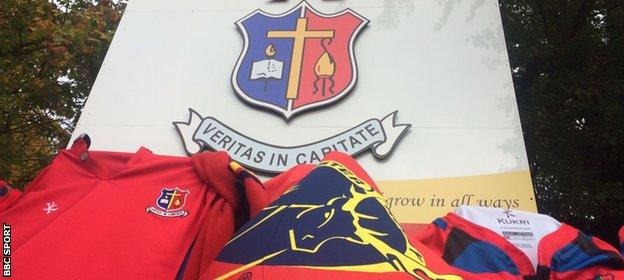
The shirts of Munster and St Munchin's College line the gates at Anthony Foley's old school
"You could feel the atmosphere here on Monday morning," says principal David Quilter. "Two hundred pupils in the canteen, but no-one talking. Just whispering. You could feel the grief.
"We held an assembly. We stated that Anthony was proud of St Munchin's but St Munchin's was proud of Anthony. That we had lost a legend.
"Some of our students live next door to the Foleys. A lot live in the same parish. We made space and time for our pupils to grieve.
"He was a regular visitor. He was part and parcel of the place. We would often ring him to ask him to speak to our teams, and it was never no. Always 'I'll be in.'
"He was more comfortable in the dressing room than he ever was in the staff room. He would speak to the boys, and it would be a simple talk, but every word had meaning behind it.
"He would point at the crest at the jersey. He would talk about having pride in your school, pride in your jersey, pride in your team-mates. He would clench his fist and say, a closed fist of five fingers is much stronger than an open hand with five separate fingers. Bind together. Walk together."
Tears are forming again. "Anthony was the epitome of a Munster man. You have to be a team man, you have to be a man of actions, you have to be a man of total commitment.
"You have to be a man of respect for the opposition, but yes, you will leave your dent on every game. You will rally your team, you will rally supporters. It is all about family and it is about commitment. That's what it means to be a Munster man."
As bright afternoon turns to dark evening, a silence falls among the hundreds lining the suburban street outside Thomond Park.
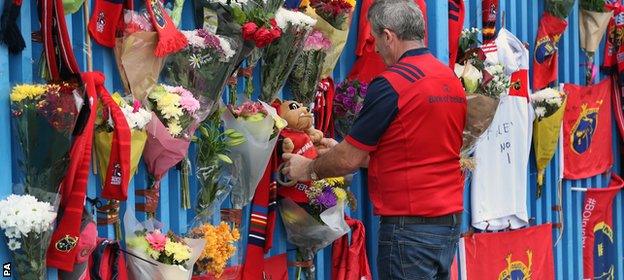
Fans paid tributes to Foley at Thomond Park - home to both Shannon and provincial side Munster
The hearse ghosts quietly into view, flanked by two idling police motorbikes. Mick Galwey in the front, the coffin carrying Foley draped in the red flag of Munster. Noel Healy leads the singing of Shannon's anthem, 'There Is An Isle', and the men and women of Limerick join in.
Sometimes, when a famous son dies, there is a sense that those mourning loved that person but never truly knew them. Not here.
The whole of the city seems represented - old rugby men with old rugby faces, sharp-eyed kids in Munster jerseys on parents' shoulders, mothers in the stripes of Shannon, teenagers looking cold in Ireland hoodies. Those singing certainly loved Foley, but they knew him intimately too.
Later the cortege will stop at St Munchin's on its way to St Flannan's church in Killaloe, where Friday's funeral will be held and the body laid to rest. For now, men sing, and men cry.
Four days after his death in a foreign land, Foley is back amongst his own.
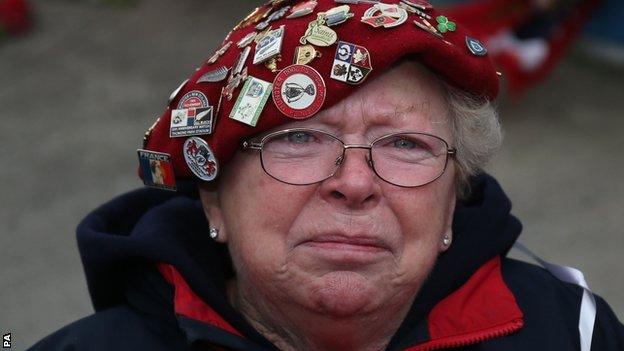
Munster fan Ann O'Neill was among those to pay tribute to Foley outside Thomond Park
- Published19 October 2016
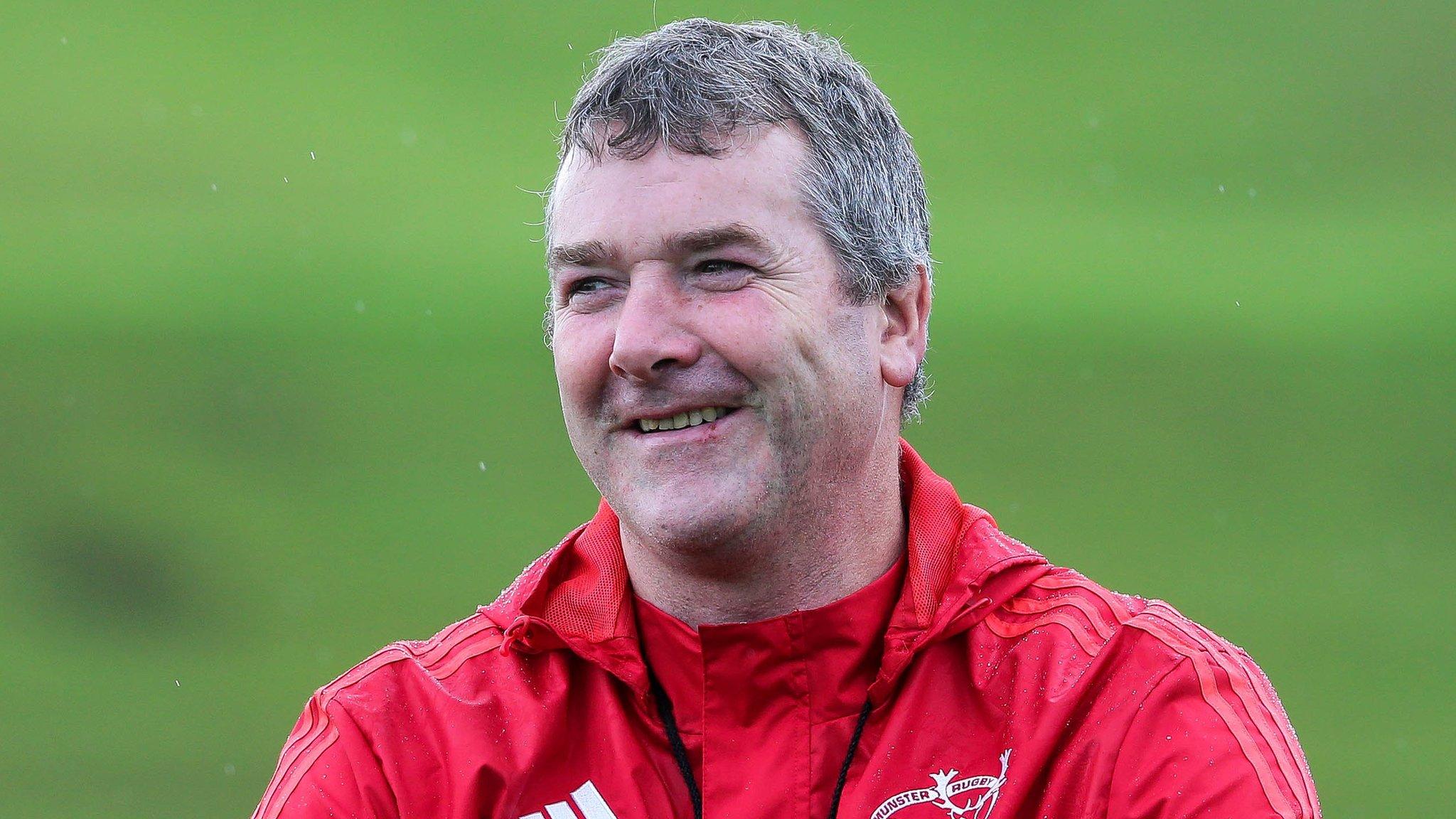
- Published18 October 2016
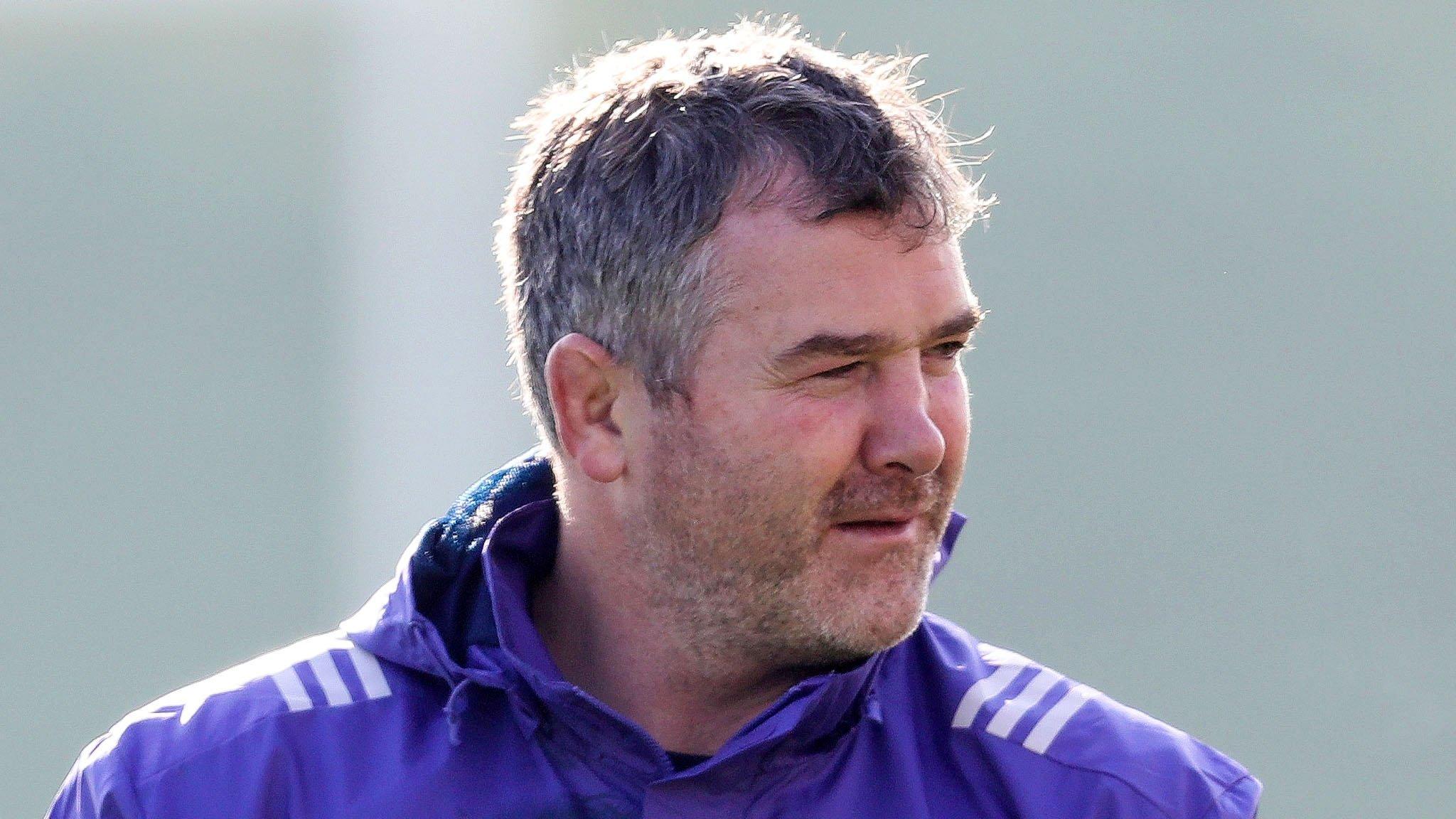
- Published18 October 2016
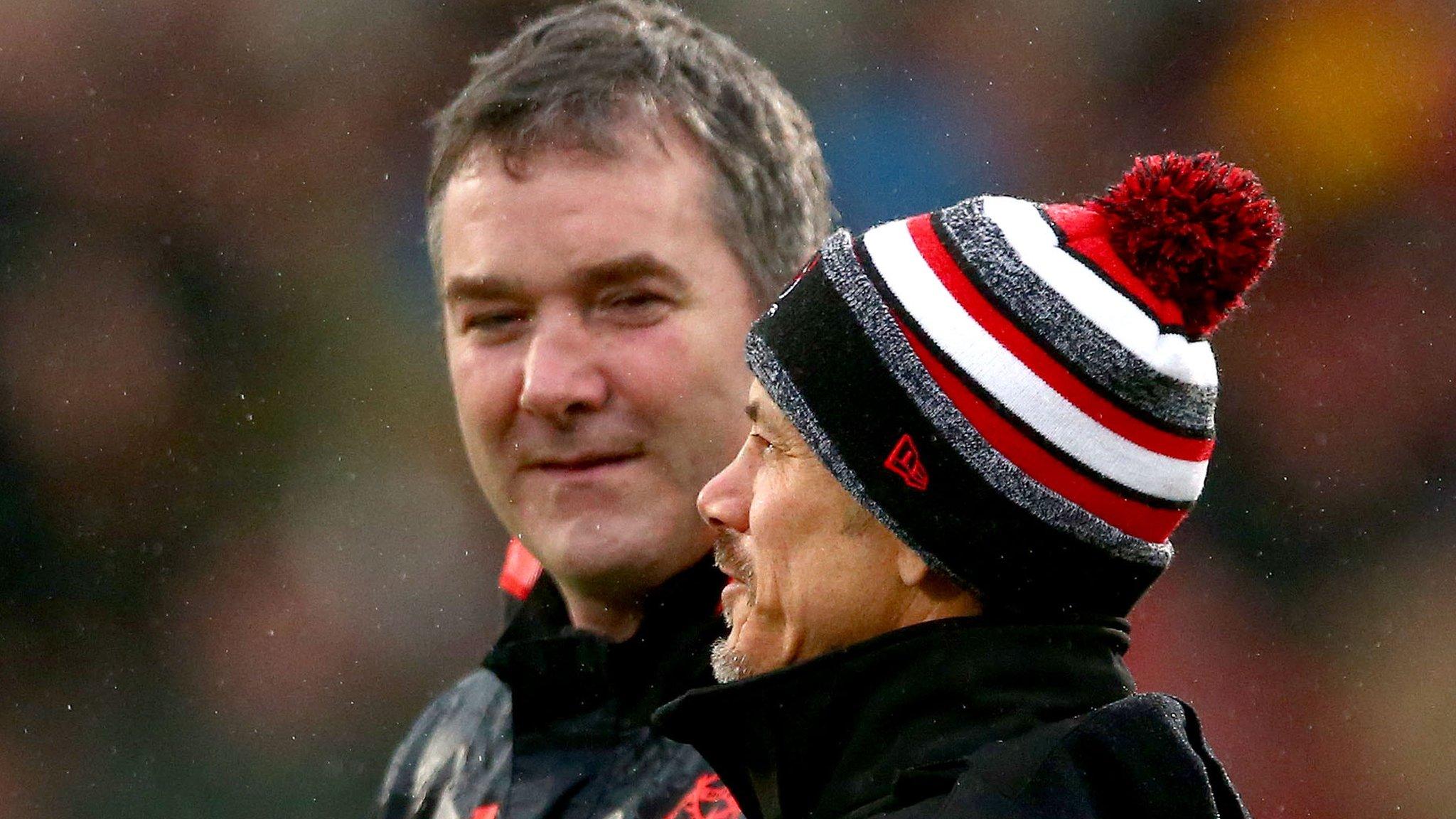
- Published17 October 2016
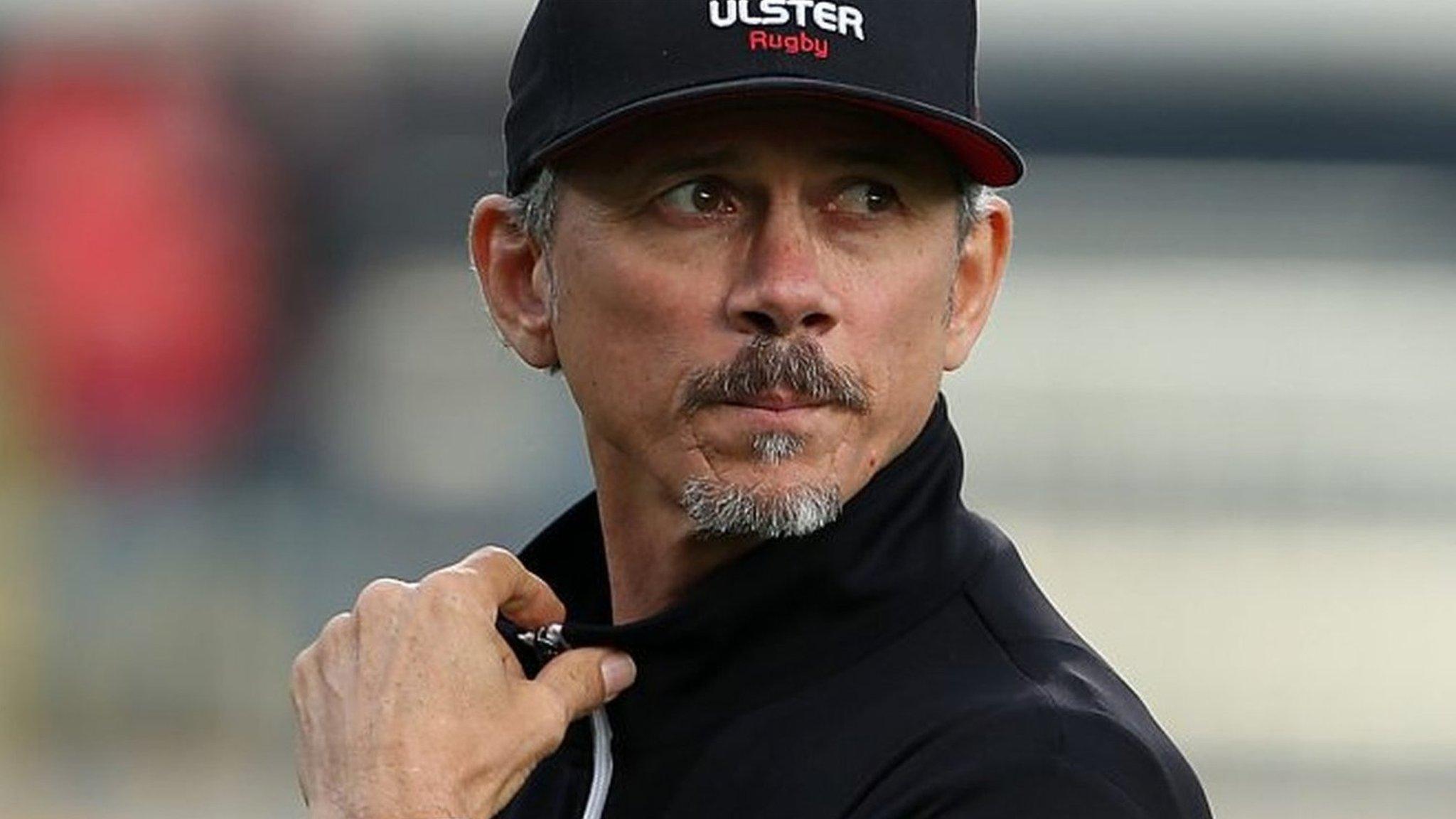
- Published17 October 2016

- Published17 October 2016
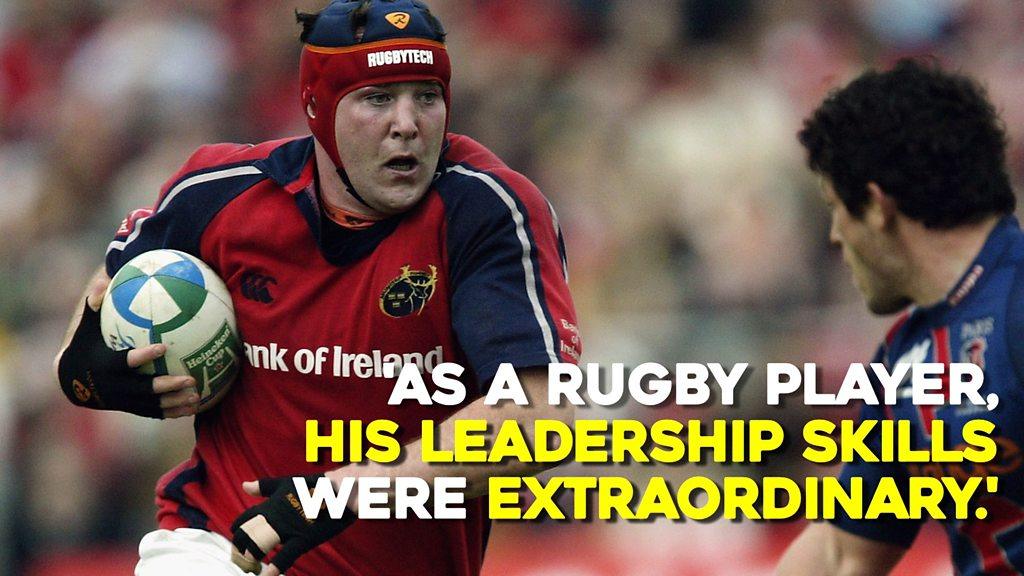
- Published16 October 2016
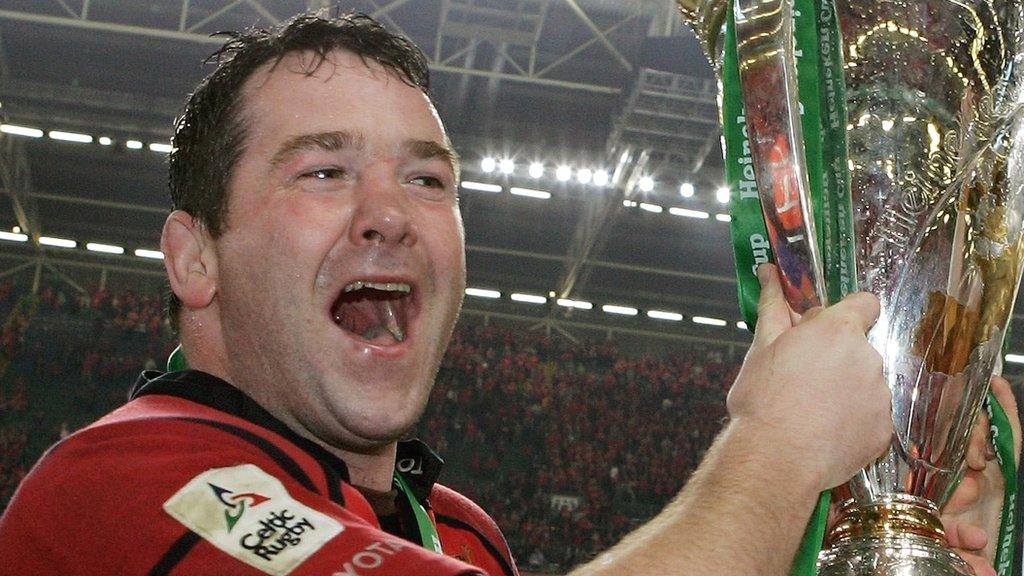
- Published16 October 2016
